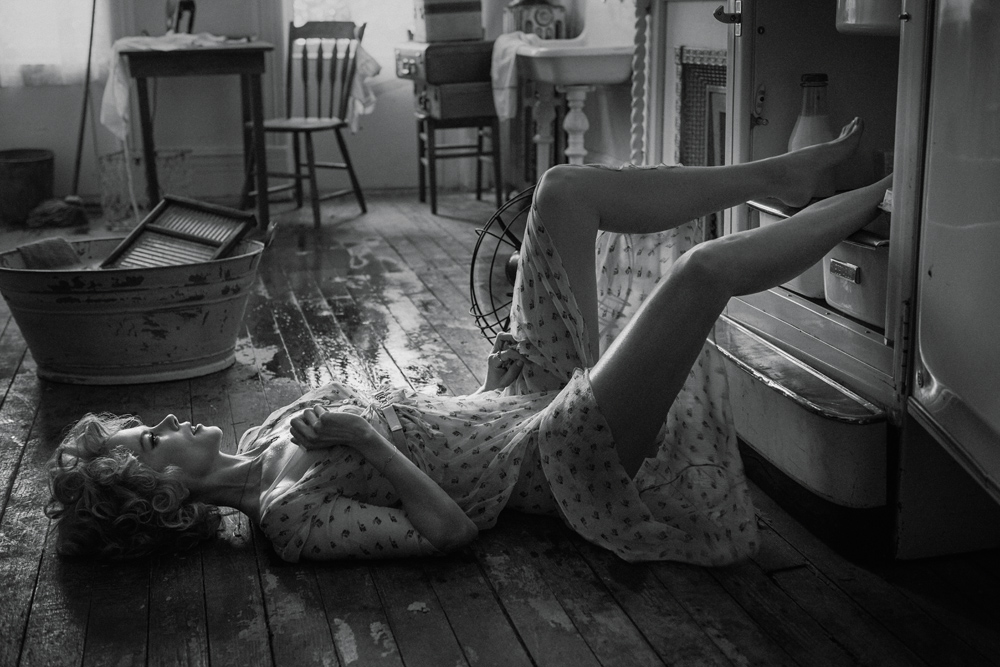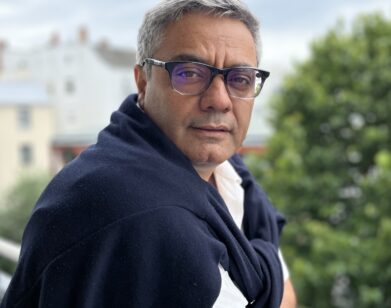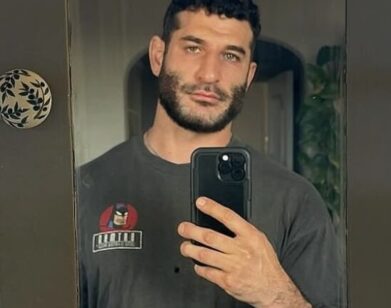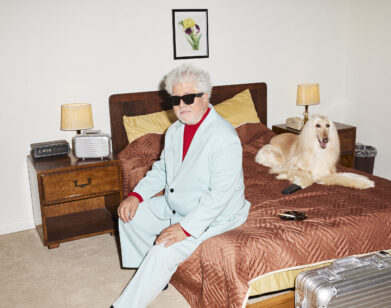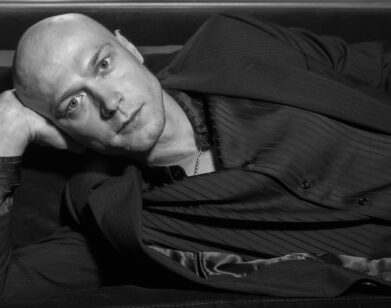Nicole Kidman
There wasn’t an industry to support [acting] when I was growing up. So it was more like a dream. That was the place that I could go, and think,‘I can get lost in this.’ NICOLE KIDMAN
Even when laid totally bare, stripped of any apparatus, clothing, or even much of a character to hide behind—as she was, acting across from her then-husband Tom Cruise in Stanley Kubrick’s Eyes Wide Shut (1999)—Nicole Kidman is utterly commanding, regal, even. And that quality, that underlying grace, mixed with her fearlessness to go there—as she is currently doing on the West End, in Photograph 51—makes her a singular performer. But what makes Kidman especially rewarding to watch, whether as the sociopathic weather reporter in To Die For (1995), the cabaret dancer in Moulin Rouge! (2001), or in her Oscar-winning performance as Virginia Woolf in The Hours (2002), is not whatever actorly effort it takes to get where she’s going, but the candor she shows when she gets there. The way she welcomes us into her characters’ thoughts, discoveries about themselves, their fears, horrors, or resolutions is entirely spellbinding and one of a kind.
Since her break-out performance, in fellow Australian Phillip Noyce’s neo-exploitation film Dead Calm in 1989, Kidman has made nearly 40 films, in every conceivable genre, working with a wide range of directors, from Tony Scott (Days of Thunder, 1990) to Lars von Trier (Dogville, 2003), from Sydney Pollack (The Interpreter, 2005) to Noah Baumbach (Margot at the Wedding, 2007), and from Jane Campion (The Portrait of a Lady, 1996) to Werner Herzog, in the forthcoming Queen of the Desert, about the British explorer Gertrude Bell.
When she interviewed photographer Steven Klein for our September 2014 issue, Kidman told him that she loves the “limbo” of performance. “I do believe that there are many different realms we can exist in,” she said, “and a lot of this is just a dream state anyway.” And, thankfully, she doesn’t look to be waking up any time soon. Next year she’ll appear in Michael Grandage’s Genius, an adaptation of A. Scott Berg’s biography of the legendary book editor Maxwell Perkins. And in November, she, Chiwetel Ejiofor, and Julia Roberts star in the dark thriller Secret in their Eyes.
“There have been times when I haven’t felt in the world,” Kidman told Klein last year, “when I haven’t cared whether I was going to be here or not, so my relationship with being on the earth was probably not as intense. And right now, there’s an intensity—I want to be here.” And here she is, in conversation with Lee Daniels, who directed her in 2012’s The Paperboy, on fear, lying, and dancing in the rain.
LEE DANIELS: Nic! Hi, honey. I just spoke to Chris yesterday. He told me that you were having the time of your life in London.
NICOLE KIDMAN: I am. I’m having a really good time here.
DANIELS: I was disappointed to hear that because, of course, I want you on my set. [both laugh]
KIDMAN: You promised me I would be there one day.
DANIELS: I can’t wait. Let’s see, what are we talking about? First, what makes you take a role? Are you afraid before you do something?
KIDMAN: Um, no. There are some things where I just jump right in. Actually, Paperboy was like that. I didn’t vacillate on Paperboy at all. I just wanted to work with you, and the character was like something out of great literature, so ripe and full. You just don’t read characters like that. Something like doing Empire is more to do with whether I can devote the amount of time I need to. I can’t pop in and pop out. I wouldn’t get there emotionally.
DANIELS: Whenever I’m with you, I get this energy like we’re being naughty. And naughty is controversial and will uncover something new that hasn’t been seen yet, a new personality trait.
KIDMAN: [laughs] I think you bring that out in pretty much everyone you work with, don’t you?
DANIELS: I don’t know. You in particular. You get this devilish look in your eye, like, “Uh-oh, what are we doing now?” Working with you, I understood what it must have been like to work with someone like Bette Davis. There’s a serenity about you. Are you aware of the hush when you come on set?
KIDMAN: No.
DANIELS: Well, there’s this hush every time you walk into a room. When you threw me that birthday party, there was this quiet, like royalty had walked in. And then you flip it on its head, because you become one of the guys. It’s very tricky of you. I’ve witnessed it, how you confuse people.
KIDMAN: I suppose expectations are strange and I shy away from them. And the whole point of being an actor is to connect. In the theater, which I’m doing now, when you walk into the rehearsal room on the first day, you’ve got to do it. I think that’s probably my main thing: just do the work. I’m not a big fan of sitting around, saying what I’m going to do. And we’ve all got brilliant ways of ducking and weaving so that we don’t have to do it. But my thing is to just get it on its feet and do it. Whether it’s a scene or just getting a character moving around. You’re going to fall flat on your face, just get back up again. By keeping it that simple, it allows me to play, because I do see it as playtime. I mean, we’re all lucky. We get paid to do it, but ultimately we’re the kids in school that never had to grow up, pretending we’re different people, and then convincing ourselves. I was with another actress the other day, and she said, “Oh, I’m not a good actress, because I’m not a good liar.” And I was like, “Golly, to me it’s the opposite.” You have to be so good at what you do that you believe it—so there’s no lie involved.
DANIELS: [laughs] Yes! I’ve seen you morph; it’s electrifying. I saw it happen in that scene on Paperboy, when we were in the car with Zac Efron, and the music was playing …
KIDMAN: Oh, that’s right. That’s a great memory.
DANIELS: And you looked at me with a twinkle in your eye, like, “This crazy fuck. I’m going to jump off the cliff with him.” I could feel that. I was like, “She thinks I’m a nut job and she loves it. She understands my insanity!” Have there been times with a director when you thought, “Oh my God, this was a mistake”?
KIDMAN: Absolutely. And it’s the difference between giving a solid performance and finding something more magical. I think so much of it is just chemistry, isn’t it? Whether you go, “Okay, we’re going to go places; I’m willing to push you to places, and then I’m going to be able to pull it all together and find the story through this.” Because I always go into it with 100 percent commitment. I try to get completely lost in it, but if I don’t have the support of the director, in that strange, altered, parallel universe where we exist, then it’s tricky. It doesn’t work. The magic doesn’t come.
DANIELS: Does your personal life ever bleed into the work? In other words, if something is fucked up in your personal life—family, husband, kids, parents, friends, what you’re going through—does any of that ever bleed into your work?
KIDMAN: Yeah, but we’re taught to bring everything—the state of being, the environment—and use it. If it’s raining, or the other actor doesn’t know his lines, everything has to be used. So your own emotional state comes into play, and I certainly remember that happening a lot on, say, The Hours, when I was going through an enormous amount of turmoil. And even though it was appropriate at times for the character [Virginia Woolf], at other times it wasn’t. But I would just bleed it in; it would manifest in different ways. For me, the idea of having a plan, that you’ve got to hit this particular place, shuts down other possibilities. And that’s probably why I work well with you because you’re also like that. You see something, you jump on it. Jane Campion is the same. You are very similar in the sense that everything is so detailed, and everything you see, or sense intuitively, you focus on and pull out.
DANIELS: I was so depressed that you were leaving us, your last day on Paperboy I was crying. And I think it started to rain.
KIDMAN: Yes!
DANIELS: I wanted to get myself out of the mood that I was in. So I said, “Let’s make it a dance number. Let’s dance!” [laughs] I was in a sad space and I wanted to see you and Zac dancing. The two of you looked at me and burst out laughing. And the two of you went out into the rain and danced, and it was magical.
I WOULD CATCH THE BUS AND GO INTO A THEATER ON A SATURDAY MORNING AND DO CLASSES INSTEAD OF GOING TO THE BEACH OR PLAYING . . . I WAS LOOKING FOR KINDRED SPIRITS.NICOLE KIDMAN
KIDMAN: Well, that’s amazing. It’s fun and it’s bold, and you’re doing that with a TV series right now. You’ve turned it completely on its head. And you love creating such fierce women.
DANIELS: I do. I like formidable women. I like working with women, women that I connect with.
KIDMAN: Why is that?
DANIELS: I don’t know why. Because I love women. I’m obsessed. It’s a damn shame I’m gay!
KIDMAN: A damn shame. Shame on you!
DANIELS: [laughs] Here’s the thing, when you find a rare breed, like yourself, like Taraji, like Halle Berry … I call you guys unicorns, because you’re beautiful to look at, but if you detect bullshit, you’ll nip me, you’ll nip anybody who’s coming at you with bullshit. You don’t play around. You take this craft very seriously. It’s what separates you, what separates an actor from an artist.
KIDMAN: I really want to be a unicorn.
DANIELS: And what kills me is that you don’t complain. I don’t know whether that’s a good or bad thing. I remember the love scene you did with John Cusack. I said, “John, you’re hurting her.” You were bent over the washer and dryer. I said, “Nicole, are you okay?” And you said, “I’m fine.” But it was clear that he was throwing you around the fucking room like a mop. [laughs] And the next day you came to set bruised. Is that a part of your discipline?
KIDMAN: Yeah. And also I want to protect the other actor, because he’s finding it and doing it. I want him to feel free. Actors have to protect each other in a way. The idea of humiliating another actor or being humiliated myself is devastating. So that’s why, if he’s a little rougher than he knows he’s being, the last thing I want to say is, “Oh my gosh, you hurt me.” Most actors are like that. We all go, “No, no. I’m fine. Don’t worry about it.” Because that’s how you release into things and find stuff. If you’re tentative and scared that you’re hurting someone or that you’re overstepping a line or that there’s a boundary that you’ve crossed, it makes everybody too cautious.
DANIELS: I remember the very first movie I saw you in was a movie with Thandie Newton …
KIDMAN: Flirting [1990], yeah.
DANIELS: It was fabulous. It was fun. Was that your first movie?
KIDMAN: No. I actually started working when I was 14. I did a thing called Bush Christmas [1983]. And then I did the infamous-in-Australia BMX Bandits [1983]. I was so happy to get out of school and ride a BMX bike and get paid to do it. But my first big film was Dead Calm. I did a miniseries in Australia called Vietnam with the same director of Flirting.
DANIELS: Can you imagine making a living at what you do at 14 for your entire life? So you were a child actress. I didn’t know that.
KIDMAN: Before I got a job, I would catch the bus and go to a theater on a Saturday morning and do classes instead of going to the beach or playing. It was completely self-motivated. My father was a biochemist and my mom was a nurse educator, and they were like, “Who is this black sheep of the family?” [laughs] At that age, I was seeking it out. And I was looking for kindred spirits.
DANIELS: Did you think you were a freak? Did you think you were different?
KIDMAN: Definitely. I would read huge novels—I read War and Peace when I was 12 years old—because that was a way to get lost in another world and another life. My mother would keep me in, out of the sun, because I was so pale, and she would give me books to read. So I read most of the Russians: Dostoevsky, Tolstoy. I had a reading list. Classic novels: French, Russian, English. And I just slowly crossed them off the list. Around that time is when my imagination was piqued. I found the joy of becoming a character through those novels.
DANIELS: There’s that first character, that moment when you knew … For me, I was 8 years old and I was in a public library in Philadelphia. I read Who’s Afraid of Virginia Woolf? and I took that book home and had my friends play the characters out—George and Martha. I directed them right there. [both laugh] What was that first experience for you when you lost your virginity to the arts?
KIDMAN: In Australia, it’s not like I was told, “Oh, you can become a professional actor,” because there wasn’t an industry to support it when I was growing up. So it was more like a dream. That was the place that I could go, and think, “I can get lost in this.” I came from a highly academic family. And so I was not coming at the idea of acting as a career, a profession. I mean, it wasn’t really encouraged. It was like, “Well, you’ve got to have something that you’re really going to do, because that’s not going to pan out.” But the first actual moment I knew I was going to be an actress was probably when I was in drama school. I did Spring Awakening at the Australian Theatre for Young People. I played Wendla in Spring Awakening, which is a really fantastic play. But in that, I had to ask the boy to beat me, in the amazing scene where she finds a switch and tells him to hit her with it. Because she is sort of confused as to why she was feeling pleasure. And at 14 to be dealing with that subject matter was really extraordinary for me. I could understand it intuitively, in a way. It was fun, but it was also dangerous. And all of those things are what still keep me doing it today. It was discovery. And I’ve always been somebody on a journey of discovery.
DANIELS: Is it the experience that excites you? I mean, I like all my work equally. I look at the projects as children. I look at the experience more than the end result.
KIDMAN: Well, as an actor you don’t control the end result. Because you’re a director, you get to control the end result. I think for us, we really have to show up and participate and give. And then let go. An actor who’s a control freak, that doesn’t work. We have to be malleable. We cannot come in and try to control or dominate.
DANIELS: What terrifies you, Nic?
KIDMAN: Well, I’m over here on this play and I’m terrified-terrified and exhilarated because I’ve got to make this incredibly acerbic, prickly woman real and vulnerable. You’ve got to feel her motivation. You’ve got to understand her. I’ve got to make that work. And there’s no interval. It’s a 95-minute play. And I haven’t done that for 17 years. It’s a whole different ballgame.
DANIELS: What was the name of that wonderful thing that I saw you in on Broadway?
KIDMAN: The Blue Room. It was a two-person thing. I started that in London. I’ve come back to London to do this play, because I love the actors here. I feel very comfortable here. So I’m over here trying to make it work. I just saw Bradley Cooper and Patricia Clarkson and Alessandro Nivola in The Elephant Man, and it’s incredibly inspiring. They made it work. It was beautiful. Standing ovation. I had tears running down my cheek. These are some of the finest actors in the world up there treading the boards. Laura Linney said it to me. I told her, “I’m really scared.” She said, “It’s good, honest work.” And the simplicity of that really resonated. It’s so nice to be doing honest work. I jumped over to do this play with the director Michael Grandage. He also directed the film Genius, in which I play a small role—the lead roles are Colin Firth and Jude Law. Michael’s lovely. You’d love him. Have you met him?
DANIELS: No. I haven’t met him. All I know is that he stopped you from doing Empire and I’m furious. [both laugh] I have to get you on the show.
KIDMAN: Let’s go play, Lee! I’ve seen recent photos of you—you look gorgeous.
DANIELS: Do I?
KIDMAN: Gorgeous.
I’M NOT A BIG FAN OF SITTING AROUND, SAYING WHAT I’M GOING TO DO. AND WE’VE ALL GOT BRILLIANT WAYS OF DUCKING AND WEAVING SO THAT WE DON’T HAVE TO DO IT. BUT MY THING IS TO JUST GET IT ON ITS FEET AND DO IT. NICOLE KIDMAN
DANIELS: Oh, great. You know what it is? I give myself to my work. But I knew that I was going to die if I continued to give everything. I didn’t really care about my physical health; I only cared about what was on screen. And I really wasn’t taking care of myself. So I just started exercising. And I feel good. Exercising and eating right.
KIDMAN: And do you notice a difference?
DANIELS: Yeah. I’ve got guys looking at me now. [both laugh]
KIDMAN: Well, it suits you. Success suits you.
DANIELS: I’m ready to go to work. I’m dying to work with you again. If I’m not in love with you, and if I don’t want to make love to you, then I’m not interested in working with you. You have to want to fuck every male, female, whatever it is that you work with. [Kidman laughs] I know that sounds sort of vile, but it’s the truth. You just don’t cross the line. You have to love, without judgment, every actor that you’re working with to make beauty. And I just can’t wait to jump into bed with you again.
KIDMAN: I’ll jump into anything with you.
DANIELS: Yay! Okay, I’m going to go to the editingroom …
KIDMAN: And I have to try and go to sleep. That’s going to be hard.
DANIELS: Oh you can. Are you drinking?
KIDMAN: No.
DANIELS: Do you ever drink?
KIDMAN: No. Sleep and good living, right? My little girl is coming in and out making gestures to get off the phone. I keep having to hold my hand up like a stop sign.
DANIELS: Well, go to them. I’m going to bid you adieu. I love you so much. And I’ll talk to you soon.
KIDMAN: Talk to you soon. Mwah!
LEE DANIELS IS THE DIRECTOR OF PRECIOUS, THE PAPERBOY, AND LEE DANIELS’ THE BUTLER. SEASON TWO OF HIS SHOW EMPIRE IS CURRENTLY AIRING ON FOX.

